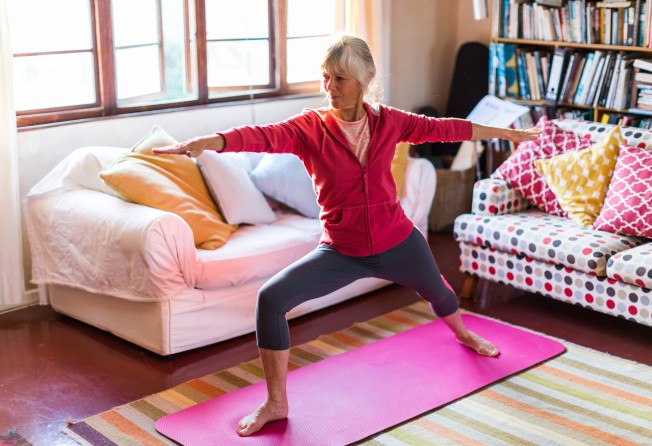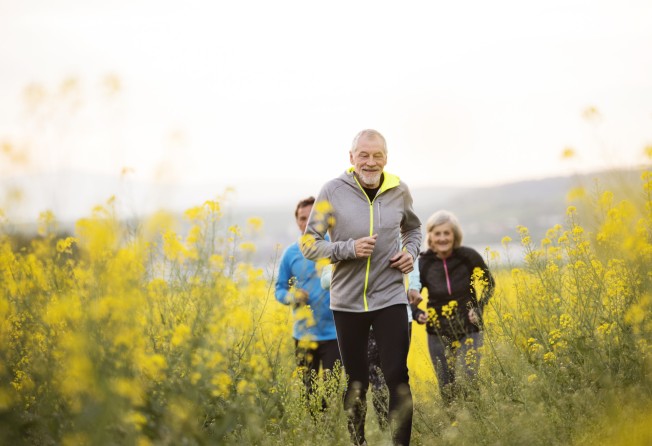
New exercise benefits unveiled: studies show how it helps fight depression, improves heart health in stressed people, and delays effects of ageing
- New research reveals additional ways regular physical activity can help people with depression and anxiety, and improve muscle and brain health
- If exercising more is on your agenda, avoid pushing yourself too hard to prevent injuries, and be sure to stretch before and after a workout

We know that exercise is good for us. In the short-term it enhances sleep quality, helps us manage stress better and regulates blood pressure. In the long-term, it may reduce our risk of developing dementia, depression, and chronic illnesses like cancer and cardiovascular disease. It also helps with weight control and bone strength.
Now, studies have found that regular physical activity can improve our health in even more meaningful ways. Here are the latest findings.
1. Exercise offers unique benefits for people with depression
Exercise has long been known to improve our mental health, easing symptoms of depression, alleviating anxiety, reducing stress, and increasing self-esteem and self-confidence, says Trixie Velez, co-founder of Defin8 Fitness in Hong Kong.

“Not only does exercise physically remove us from potentially stressful situations, our brain releases feel-good chemicals called endorphins, and forces the central and sympathetic nervous systems to communicate, which can improve our body’s response to stress.
“In addition, exercise increases our heart rate, which stimulates the production of norepinephrine, a hormone and brain neurotransmitter that can improve mental clarity during a stressful event.
“And, just taking time out for yourself to exercise, and making this a part of your regular routine, can make you mentally stronger, too.”
Researchers at Iowa State University (ISU) in the United States studied how acute exercise – one exercise session in a day – influenced primary depression symptoms. They found exercising for just half an hour reduced symptoms for at least 75 minutes after the workout.
That’s promising for people with depression, as the results “suggest a window of time post-exercise when it may be easier or more effective for [them] to do something psychologically or cognitively demanding”, said kinesiology professor Jacob Meyer, a lead author of the study.

He added that this could include giving a presentation, taking a test or going to therapy.
Meyer and his ISU team conducted a separate study to learn whether they could synergise the short-term benefits from exercise and the long-term benefits from therapy to deliver the most effective overall intervention for chronic depression.
What they discovered was that exercise amplified the benefits of cognitive behaviour therapy for adults with depression. A possible reason: participants who exercised before their session reported a quicker and stronger connection with their therapists. It’s thought that people who connect with their therapist are more likely to continue therapy; there’s also a higher chance that their sessions will have a greater impact.
The researchers suggested that exercise may prime the brain to engage with more emotionally challenging work that can take place during therapy.
2. Exercise improves heart health in people with stress-related conditions
More good news for people with depression: regular physical activity was found to significantly improve their cardiovascular health compared to people without depression. The same was reported in people with anxiety, too.

New research, presented in April at the American College of Cardiology’s 71st Annual Scientific Session, revealed that individuals who got at least 150 minutes of moderate-intensity exercise per week were 17 per cent less likely to suffer a major adverse cardiovascular event – such as a heart attack – than those who exercised less.
These benefits were far greater in people with anxiety or depression – they had a 22 per cent risk reduction versus a 10 per cent risk reduction in those without either condition.
We know that exercise lowers our risk of cardiovascular disease as it improves blood circulation and oxygenation and helps reduce blood pressure and cholesterol, but the researchers for this study noted that regular physical activity also affects the way our brain responds to stress.
People with depression or anxiety have higher stress-related neural activity and a higher risk of cardiovascular disease. This new research “emphasises the importance of the stress-related neural mechanisms by which physical activity acts to reduce cardiovascular risk”, said Hadil Zureigat, MD, the study’s lead author at Massachusetts General Hospital in the United States.
3. Exercise keeps muscles healthy
Lifelong exercise was recently discovered to protect against age-related loss of muscle mass and function.

The study, published in February in The Journal of Physiology, looked at males aged 68 and older who had been physically active throughout their adult life. The researchers from the University of Copenhagen in Denmark found that those who’d taken part in resistance exercise, ball games, racket sports, swimming, cycling, running and/or rowing had a greater number of muscle stem cells – which are important for muscle regeneration and long-term growth, and help protect against nerve decay.
According to lead author Casper Soendenbroe, this is the first study in humans to find that lifelong, recreational exercise could delay some detrimental effects of ageing.
“The single most important message from this study is that even a little exercise seems to go a long way when it comes to protecting against the age-related decline in muscle function. This is an encouraging finding which can hopefully spur more people to engage in an activity that they enjoy.”
More studies are needed to see if women would enjoy the same benefits, and to see if the benefits of lifelong physical activity are maintained when people are older, say, 80 and above, when the effects of ageing on muscle health become more pronounced.
“As we age, we lose muscle mass, strength and bone density, and our telomeres – caps on the ends of our DNA strands – shorten,” adds Velez.
“Regular physical activity really helps reduce ageing at a cellular level. I recommend doing a variety of exercises, from resistance training and weight-bearing activities to low- and high-intensity training as well as endurance exercises to maintain muscle strength and health.”

4. Exercise may protect our brain as we age
Researchers at the University of Georgia in the United States recently found that physical activity, even if not intense or strenuous, could help protect our cognitive abilities.
The small study, published this January in the journal Sport Sciences for Health, tracked the physical activity and fitness measurements of 51 older adults. The participants then performed tests designed to measure cognitive functioning and underwent MRIs to assess brain functioning.
Certain tasks, such as recalling information and exhibiting self-control, become more difficult as we age, because the brain networks that allow us to perform these tasks may not function as well as they should.
The study looked at how these networks interact with physical activity and fitness to affect how the brain functions; it was found that when people whose brain networks aren’t functioning optimally engage in physical activity, they showed an improvement in their brain function.
You don’t need to run marathons to reap these benefits, said Marissa Gogniat, lead author of the study.
“Maybe just take the stairs on the way to work. Stand up and walk around a little bit more. That’s where you get the most bang for your buck, not crazy, high-intensity exercise.”

Whatever your age, if you plan to include more exercise in your routine, don’t overdo it, says Norma Ngai, the physiotherapy department lead at Hong Kong’s Matilda International Hospital.
“Remember to warm up with a low-intensity cardiovascular activity and some stretching, to slowly ramp up your heart rate and breathing and prepare your muscles before the workout. When you start working out, do it slowly, gradually increasing the intensity and amount of exercise as you go.
“After your session, cool down immediately with a low-intensity cardiovascular activity and stretching. These will slow down your heart rate and blood pressure to prevent lightheadedness and reduce the build-up of lactic acid in your muscles.”